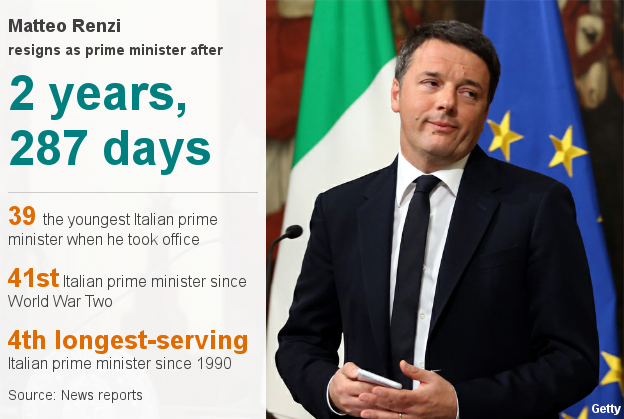Outgoing Italian PM Matteo Renzi has agreed to stay in power until the Senate passes its 2017 budget in the coming days, the president says.
Mr Renzi formally resigned after his heavy defeat in a constitutional referendum a day earlier, but the president requested the delay.
President Sergio Mattarella will later have to either choose a new prime minister or call early elections.
European leaders have been playing down the risks of fallout from the crisis.
It comes amid fears of long-term instability for the country’s troubled banking sector in the long-term. Shares in Italian banks lost ground following news of Mr Renzi’s defeat.
Sunday’s No vote on constitutional reform was widely seen as a rejection of establishment politics in Italy.
- Get all the latest updates
- Italian press on ‘popular revolt’
- Why Italy’s vote matters
What happens next?
Mr Renzi held a final brief cabinet meeting on Monday evening, before travelling to the presidential palace to submit his formal resignation.
President Mattarella then asked him to stay on for the budget bill, which is expected to be passed by the Senate in a matter of days – Friday at the earliest.
He wanted to avoid “the risks of a provisional budget”, the president said in a statement (in Italian).

Anti-establishment opposition parties have been calling for early elections, although it is unclear yet whether this will happen.
Instead, the president may appoint a caretaker administration led by Mr Renzi’s Democratic Party, which would carry on until an election due in the spring of 2018.
Finance Minister Pier Carlo Padoan is the favourite to succeed Mr Renzi as prime minister.
Why did he lose?
The No vote won with nearly 60% against 40% for the Yes campaign. With a turnout of nearly 70%, it was a heavier than expected defeat for the government.
Mr Renzi staked his political future on his attempt to change Italy’s cumbersome political system. He wanted to strengthen central government and weaken the Senate, the upper house of parliament.
 Image copyrightEPA
Image copyrightEPAHis opponents – including some within his own party – had argued that the reforms would give the prime minister too much power. The electorate agreed.
More than a resounding victory for the No camp, it was a chance for a medley of populist parties to reject establishment politics.
The opposition, headed by the Five Star Movement, capitalised on Mr Renzi’s declining popularity, years of economic stagnation, and the problems caused by tens of thousands of migrants arriving in Italy from Africa.
- Watch market reaction
- Italian banks’ shares fall after vote
- The weakest bank in Europe just got weaker
After the vote, Mr Renzi defended his record, saying exports and job numbers were up and unemployment was down to 11.7%.
 Image copyrightEPA
Image copyrightEPAFive Star’s leader, Beppe Grillo, has called for an election “within a week”.
President Mattarella, who praised the high voter turnout, called for a political climate with “serenity and mutual respect”.
There are obligations and deadlines which Italy’s institutions will have to honour “guaranteeing a response that meets the problems of the moment,” he said.
How is Europe reacting?
The result is being seen as a blow to the EU, although there is no question of Italy following the UK out of the door.
Both Five Star and the Northern League are opposed to the eurozone but not to membership of the EU itself.
 Image copyrightREUTERS
Image copyrightREUTERSJeroen Dijsselbloem, who heads the group of 19 eurozone countries, denied any impending crisis.
“It doesn’t really change the situation economically in Italy or in the Italian banks. The problems that we have today are the problems that we had yesterday,” he said.
Reuters news agency quoted German Finance Minister Wolfgang Schaeuble as saying there was no reason for a euro crisis but that Italy urgently needed a functioning government.
Meanwhile, a spokesman for Chancellor Angela Merkel said she “took note with regret” of Mr Renzi’s resignation but Germany would offer to work closely with the next Italian government.
 Image copyrightTWITTER
Image copyrightTWITTERBut the leader of the far-right Front National in France, Marine Le Pen, tweeted: “The Italians have disavowed the EU and Renzi. We must listen to this thirst for freedom of nations.”
What will it do to the economy?
Markets seemed to have taken Mr Renzi’s departure in their stride in the short-term. The euro fell initially to a 20-month low but rebounded again. Shares in Italian banks lost ground on Monday afternoon, following a dip and rebound in the morning.
But there are concerns over the long-term financial stability in the eurozone’s third largest economy.
The economy is 12% smaller than when the financial crisis began in 2008.
The banks remain weak and the country’s debt-to-GDP ratio, at 133%, (second only to Greece’s in the eurozone) means many Italian banks are in need of refinancing.
There is a risk that the failure of a major bank – such as the troubled Banca Monte dei Paschi di Siena – could set off a wider crisis, but repairing the banks becomes more difficult amid political uncertainty.
The head of Germany’s Bundesbank, Jens Weidmann, said the result was “not the end of the world” but that a slowdown in the pace of economic reforms should be expected.
[Source:-BBC]



